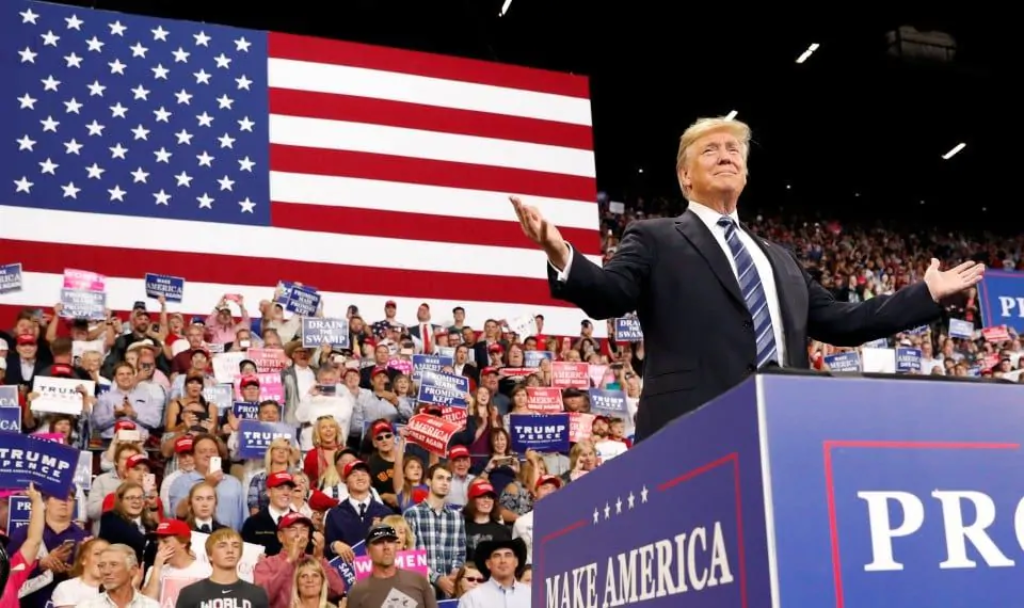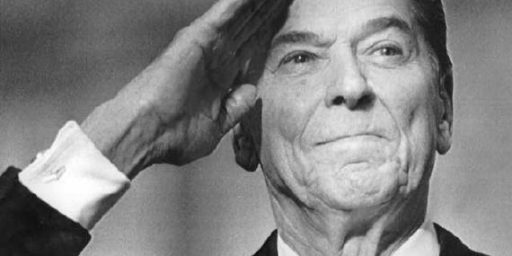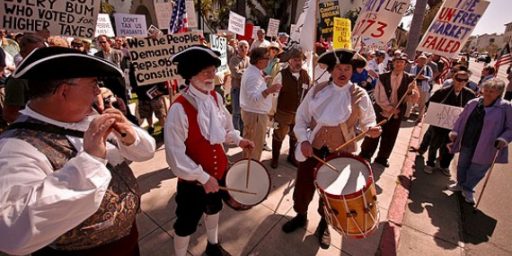The Link Between Trump And The Tea Party
Trumpism is a direct by-product of the poisonous populism of the Tea Party movement, and they've both taken over the Republican Party.

In a piece at The Washington Post, Bryan Gervais and Irwin Morris, respectively Professors at the Universities of Texas and Maryland, bring attention to something that I have written about in the past, namely the connection between the rise of the Tea Party in the wake of the 2008 election and the campaign and eventual election of Donald Trump and what all that says about the future course of whatever might be left of conservatism and the Republican Party:
What distinguished tea party Republicans in the House was not their views on fiscal issues, but their views on social and racial issues. House members most aligned with the tea party were more socially and racially conservative than other Republicans. In this way, tea party Republicans in the House resembled rank-and-file members of the tea party movement.
The same is true of Trump. Although during the presidential campaign he took quite unorthodox positions on fiscal issues — defending entitlement programs and suggesting that he would raise taxes on the wealthy — as president he has instead instituted a tax cut that would benefit the wealthy and also proposed large cuts to government spending. Now he does not appear that distinct from the “Taxed Enough Already” party and the GOP generally. Conservative views on fiscal issues are not what distinguishes Trump.
Instead, it is social and racial issues. For example, House tea party members were more likely than other House Republicans to take conservative positions on abortion rights and employer-mandated coverage for contraception — not unlike the conservative position Trump has taken on these issues as well as other social issues such as LGBT rights.
Tea partyers tended to take more conservative positions on issues such as the defunding of Deferred Action for Childhood Arrivals, opposition to funding for “sanctuary cities” and support for federal contracting with corporations that violated the Fair Labor Standards Act. Likewise, Trump’s rhetoric and policies on civil rights and immigration match the views of tea party Republicans. Trump’s conservative positions on immigration — from the construction of the border wall to the revitalization of ICE — and his strong support for stronger voter identification laws resemble the conservatism of tea party Republicans, even as other Republicans stop short of endorsing Trump’s rhetoric about immigrants or policies like family separation.
The tea party and Trump resemble each other not only in substance, but in style and rhetoric. Trump is, of course, famously combative. In particular, his attacks on opponents and “digital shouting” has produced countless analyses of how he uses Twitter.
Here again, House tea party members were not much different. We analyzed the official Twitter accounts of House Republicans during the 113th Congress and found that tea party Republicans use uncivil, hyperbolic rhetoric more often than other House Republicans. Of course, Trump’s incivility — on and off Twitter — predated the rise of the tea party. But the tea party’s own incivility arguably prepared the GOP for a candidate like Trump.
There is at least one other similarity. Trump’s campaign was predicated on a gloomy portrait of life in this country. In his inaugural address, he famously spoke of “American carnage.” This same theme was also present among tea party legislators. They were more likely than other House Republicans to describe an America in decline, one in which Americans had experienced losses at the hands of a failing, and even abusive federal government led by President Barack Obama, and one in which even the American way of life was under threat, including from Muslims and undocumented immigrants.
The larger truth here is that the so-called “Tea Party” was a fraud from the beginning. Instead of being motivated by opposition to higher taxes, spending, deficits, or the size of government. Instead, it was and always has been a movement built around other far more partisan concerns. The first concern, of course, was opposition to the Presidency of Barack Obama and, both before and after him Hillary Clinton This kind of personality based movement wasn’t new on the right, of course, we saw much the same thing during the Clinton Administration, for example. Additionally, the Tea Party has routinely made enemies out of others on the left, moving easily from Nancy Pelosi to Harry Reid, Elizabeth Warren (the person who Trump now mocks as “Pocahontas”), and Chuck Schumer. Presumably, they’ll do the same thing to whomever the Democrats nominate in 2020. By contrast, this so-called movement, its leaders, and the politicians that claimed its mantle and received the support of were all silent during the Administration of George W. Bush when government spending and debt was exploding at absurd rates and the nation was fighting wars that it arguably shouldn’t have been involved in (and which, in at least one case, it quite clearly should not have been involved in.) Now that the Trump Administration is in power alongside a Republican Congress, they are all silent once again and seem more focused on restricting immigration and advancing conservative positions on social issues such as abortion while engaging in other cultural war battles than they are on fiscal issues.
Anyone who paid attention to the Tea Party rallies even as far back as 2009 can recall that the movement was being motivated by far more than just that “original agenda.” Issues such as immigration and the aforementioned social issues were as much as part of the movement as any concern about freedom or fiscal responsibility. In fact, the same politicians that were part of the movement were also leaders when it came to things like opposition to immigration reform and advocates for restrictions on LGBT and abortion rights. Another factor that was evident in the Tea Party from the beginning was the same kind of close-minded populist nationalism that epitomizes Trumpism in the ideology that drove the Tea Party movement, It was evident in the rhetoric of the people who emerged as spokespersons for the movement, in the politicians that the movement end up backing, and the rhetoric that was prevalent at Tea Party rallies from the beginning of the movement. Go back and listen to all of that, and you can see the seeds of Trumpism being planted, not that it took much for those seeds to bloom.
For some time now, I’ve argued that one can draw a direct line from Trumpism back in time to the Tea Party and, before that, to the populist conservatism that began emerging in the 1990s when the intellectual conservatism of Buckley, Reagan, and Goldwater began to be replaced by the populist conservatism of Rush Limbaugh, Sean Hannity, and Fox News Channel. It was back then, after the end of the Cold War when many on the right how the uneasy alliance that bound Republican moderates, hardcore conservatives, and the more libertarian-leaning ideas that mostly came out of the West and Southwest together during the Cold War. As it turned out, that alliance was replaced by the populism that these new media sources represented, and which politicians such as Newt Gingrich quickly learned to exploit to their political advantage. Slowly but surely, it was that brand of “conservatism” that won the battle and that now finds itself in control in the person of Donald Trump and the collection of sycophants, sellouts, and cowards on Capitol Hill that are going along with him even though many of them know on some level that it will ultimately lead their party to disaster. Rather than being a corruption of the Tea Party or the populist conservatism of the 1990s, Trump represents its apex. That may be an uncomfortable fact for people who were involved in the movement who believed it was something else, but it doesn’t make that fact any less true. In the end, the Tea Party was about nothing but blind populist rage and the culture war, and it led to the rise of absurd politicians such as Sarah Palin and Christine O’Donnell and, ultimately Donald Trump itself. If there are any regrets among former Tea Partiers, they have nobody to blame but themselves.






I trace it back to Patrick Buchanan and his “peasants with pitchforks” speech in–I think–1992. John McCain made Sarah Palin a national figure, but she tapped into, inadvertently or otherwise, a vein of populism that gloried in vulgarity and ignorance and exploited it to the hilt. She was too lazy and inept to run for the presidency, and possibly shrewd enough to know that she had no chance against Obama in 2012, but she did pave the way for Trump. All the Palinistas become Trumpkins, and, by God, they weren’t going to be thwarted again.
@CSK:
Yes it did start in the 90s with the end of the Cold War, the Buchanan nonsense, the rise of talk radio, the constant drumbeat of Clinton Derangement Syndrome, and the birth of Fox “News” Channel.
seen on the internet:
The element of racism could be seen in the Tea Party Movement from the very beginning. I’m not just talking about racist signs seen at rallies. For example, Tea Party Express spokesman referred to Obama as an “Indonesian Muslim welfare thug” and later published the infamously racist “Lincoln letter.”
The confusion over what the Tea Party truly represented can best be seen in the rise and fall of Marco Rubio. He came to the Senate during the Tea Party wave of 2010, knocking out establishment favorite Charlie Crist. But after Romney’s 2012 defeat, he attempted to lead the GOP into support for immigration reform, only to suffer an immediate backlash from the right from which he was never able to recover, and which paved the road for Trump’s anti-immigration, nativist campaign.
One overlooked figure who may have been the Tea Party movement’s godfather was Ron Paul. He had direct ties to white nationalists and past involvement in an overtly racist newsletter, and his 2008 candidacy anticipated certain elements of the Trump movement. As David Neiwert’s excellent book Alt-America (which I highly recommend) explains:
The book goes into considerable detail about the close (and underreported) relationship between the Tea Party and radical-right groups.
Trump was elected as a direct result of democrat policy.
If the Tea Party had its way, Ted Cruz would have been in office not Trump. as I said I swear this morning, welcome to the world the Democrats have made
If there are any regrets among former Tea Partiers, they have nobody to blame but themselves.
Actually, they can blame people like YOU since it was YOUR failures that led to the rise of the Tea Party.
Seriously…as deranged at the lefty anti-Trumpers can be (lookin’ at you Michael “Money Laundering” Reynolds), the worst and most damaging aspect of the Trump era is epic denial of Republicans/conservatives/libertarians who cling to this bizarre delusion that everything was just fine before Trump/Tea Party/Soon-To-Be-Named-Reason-X came along.
It’s not THEM. It’s YOU.
Mike
@MBunge:
It was certainly more civilized prior to Limbaugh and Company. There’s always been a strain of anti-intellectualism and anti-cultivation in American life, which can be traced back to a possibly deliberate distortion of Thomas Jefferson’s concept of the “natural aristocrat,” but the elevation of the oaf, boob, and boor as the avatar of the true American patriot reached its culmination in Donald Trump.
@Eric Florack: @MBunge:
The party of personal responsibility strikes again. Don’t like something? It’s always the DemoncRAT’s fault!!!
Immigration isn’t a race issue.
@Matt: Well he’s not totally wrong. Trump is kindof a result of Democratic policies. Most prominently, Desegregation. That’s when the Religious Right first organized. They only regrouped around Abortion several years after Roe.
Stupid people, shitty values.
@MBunge:
Are you really this deluded or are you just playing this part for laughs?
I’ll give you Buckley and Goldwater as intellectual conservatives, but the switch to populism began with Reagan and the ‘moral majority’. Reagan doubled down on the southern strategy initiated by Nixon and embraced the burgeoning politicization ‘conservative christians’. The ‘conservative christians’ pulled the republicans further and further into running on social issues, particularly abortion (which they didn’t much care about previously), but allowed them to demonize the left and push forward a socially conservative agenda that was focused on race and the idea of a ‘christian nation’. That was when the republicans damned themselves to this path. The other things you mention Limbaugh and his clones, Fox, along with Gingrich, Hastert, Army, and others accelerated them along the path Reagan began in earnest and culminated in the tea party and Trump. Nixon may have been the original sinner in this, but Saint Reagan and his alliance with Falwell et al well and truly set the republicans down the primrose path.
To be sure, republicans continued to use the veneer of economic issues to hold onto a semblance of the intellectual conservativism of the past, but it has not been the motivating animus of the average republican voter for a long time. It has kept the country club and chamber of commerce republicans on board and kept the wealthy donors giving money, but it isn’t what wins for republicans.
Relevant:
When ‘Conservatives’ Turned Into Radicals
@MBunge:
Where are Trump campaign manager Manafort and assistant campaign manager Gates right now?
In prison. For what? Money laundering, tax evasion, various frauds.
Where is former National Security Adviser going next? Prison. Foreign Policy Advisor Papadapolous? Prison. Personal attorney Michael Cohen? Prison.
Why do you suppose Manafort got a deal? Because he had nothing to give up? How about Michael Cohen? He probably also has nothing to say. You can see from trump’s calm demeanor it’s all going to be just . . . I have no attorney general! No collusion! The FBI is a cancer!
Don’t you worry, it’s all going to be fine. Cult Leader will triumph. Never you fear – that’s his job.
@Doug Mataconis:
The cult member challenged invariably doubles down. Only by absolute faith can they be saved.
@Leonard:
Self awareness has never been a front line virtue on the right.
The Tea Party didn’t exactly rise up as a spontaneous populist movement, did it? It was astroturfed with Koch Bros money. It’s issues were a mix of what the Koch Bros wanted and what they needed to say to attract the GOP base. The TP has faded now, apparently because the Kochs got what they wanted and cut funding.
My favorite story was IIRC Dick Armey talking about taxes to 50 Tea Partiers in the back room of a Denny’s. Yeah, that happened spontaneously. And somehow the supposedly liberal MSM was more interested in reporting every time a couple dozen people rallied with some guy in tricorne hat than they had been years earlier in reporting about a hundred thousand people demonstrating against invading Iraq.
Trump and the TP are alike because they’re both creatures of the Conservative Entertainment Complex. This is the only way GOPs can win. What else can they do? Run on their policies? What’s new with Trump is that he’s teaching GOPs they don’t need to dogwhistle and they can lie shamelessly without consequences.
The sad thing about the “Democrats forced us to go insane” argument is how widespread it is. Even otherwise sensible individuals who once (and a few still do) identify as Republicans have argued that the rise of Trump and tea party extremists is all the Democrats’ fault. I think even James Joyner wrote an article claiming that people ignored warnings about Trump because Democrats were mean to Romney.
If it was just the rwnjs, you could shrug it off. Unfortunately, blame shifting, lack of reflection, unwillingness to accept responsibility for anything that happens, even if it is entirely within their own party, is endemic in the GOP.
With the asshole in the White House talking about a preference for immigrants from Norway and referring to Haiti and African countries as “shithole” countries…the hell it ain’t about race…
@Kari Q:
I found the article I had been thinking of and it was not by James. Apologies to you, James, for the error. I would edit the comment if I could.
@Doug Mataconis: I have to go with deluded. He sounds a lot like my mom in the last years of her life, except that she felt bad sometime about how fearful and bigoted she had become. She felt that she couldn’t help it, though, and used to say so–often and repeatedly.
Of course, my mom had been diagnosed with Alzheimer’s dementia by that time, so I can understand what was going on to some degree. I wonder what Bunge’s excuse is.
ETA: There’s always the possibility of simply being evil in Bunge’s case, but I promised that I wouldn… oops, my bad.
Referring back to the Original, I’ve also reflected on the rise of what I call ‘radio conservatives’. Limbaugh and Levin and the like. And I have a little theory that these guys went into politics from sports-talk-format radio. Or at least the pioneers did. So their specialty in the general field of talk-radio was whipping up the fan base, getting the homies fired up. After they showed the political guys how to do it (and Richard Viguerie showed how gold could be mined in them thar hills), the real experts moved in.
@gVOR08: Self-awareness? Immigration isn’t a race issue objectvively. Subjectively, immigration isn’t a race issue to me. If it’s a race issue to you, then you’re the one whose subjective view doesn’t match reality, aod you’re the one lacking self-awareness.
If rumors are true that Ronan Farrow has gotten the Apprentice recordings of trump using a certain racial slur, it could boost him even higher with the Tea Party.
5+ years in retail taught me that there is no whinier group of entitled crybabies in America than old white men.
@Leonard: Wow! I did not know that you are the arbiter of reality vis a vis subjectivity. And I was simply going to note that the claim that immigration isn’t a race issue to you may simply make you an outlier (or is that outliar–never sure about spelling). Good thing I know now.
ETA: BTW, you may not be as clear on the difference between objectivity and subjectivity as you imagine. Don’t feel bad. Most people aren’t–especially conservatives.
@Teve: Who’s your second least favorite race/age/sex?
Oh please, if you want to be so pedantic, we can take out the word “race” and substitute it with the word “bigotry”…it is so obvious that so many people who are against immigration, particularly illegal immigration, feel that way because they don’t want more Hispanic and/or black people coming into this country…
We can always hope such idiocy is self-limiting. Personally, I’m not optimistic.
@An Interested Party:
You can be a racist interested in immigration. That doesn’t make it a racial issue. You’re a racist retailer, but retail isn’t automatically racial.
Immigration isn’t a race issue in the same sense that poll taxes aren’t a race issue. Both involve policies that are “technically” colorblind but which just happen to mostly affect nonwhites, so that the whites who implement these policies can adopt a wide-eyed innocence that racial discrimination could possibly be their motive. It’s a neat trick.
You can be an idiot interested in immigration…that doesn’t make it an idiotic issue…that just means you are an idiot…